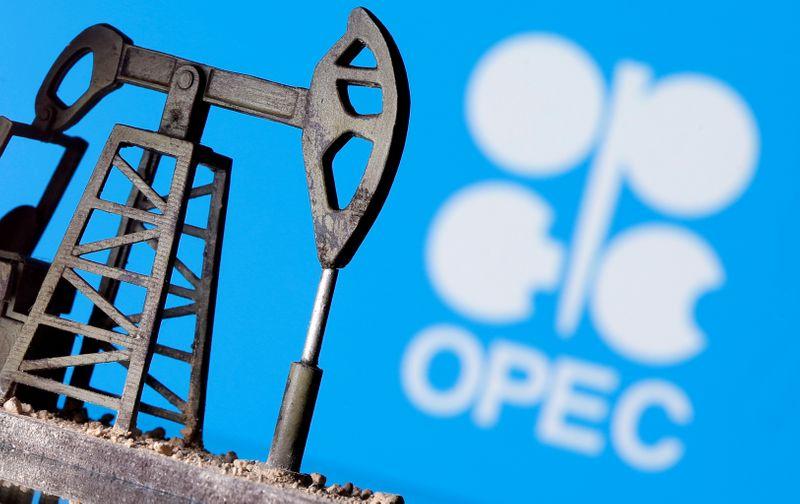By Ahmad Ghaddar, Rania El Gamal and Alex Lawler
MOSCOW/DUBAI/LONDON (Reuters) - OPEC, Russia and allies agreed on Saturday to extend record oil production cuts until the end of July, prolonging a deal that has helped crude prices double in the past two months by withdrawing almost 10% of global supplies from the market.
The group, known as OPEC+, also demanded countries such as Nigeria and Iraq, which exceeded production quotas in May and June, compensate with extra cuts in July to September.
OPEC+ had initially agreed in April that it would cut supply by 9.7 million barrels per day (bpd) during May-June to prop up prices that collapsed due to the coronavirus crisis. Those cuts were due to taper to 7.7 million bpd from July to December.
“Demand is returning as big oil-consuming economies emerge from pandemic lockdown. But we are not out of the woods yet and challenges ahead remain,” Saudi Energy Minister Prince Abdulaziz bin Salman told the video conference of OPEC+ ministers.
Benchmark Brent crude climbed to a three-month high on Friday above $42 a barrel, after diving below $20 in April. Prices still remain a third lower than at the end of 2019.
“Prices can be expected to be strong from Monday, keeping their $40 plus levels,” said Bjornar Tonhaugen from Rystad Energy.
Saudi Arabia, OPEC’s de facto leader, and Russia have to perform a balancing act of pushing up oil prices to meet their budget needs while not driving them much above $50 a barrel to avoid encouraging a resurgence of rival U.S. shale production.
Impact Shorts
More ShortsBULGING INVENTORIES
The April deal was agreed under pressure from U.S. President Donald Trump, who wants to avoid U.S. oil industry bankruptcies.
Trump, who previously threatened to pull U.S. troops out of Saudi Arabia if Riyadh did not act, spoke to the Russian and Saudi leaders before Saturday’s talks, saying he was happy with the price recovery.
While oil prices have partially recovered, they are still well below the costs of most U.S. shale producers. Shutdowns, layoffs and cost cutting continue across the United States.
As global lockdown restrictions to halt the spread of the coronavirus are being eased, oil demand is expected to exceed supply sometime in July but OPEC has yet to clear 1 billion barrels of excess oil inventories accumulated since March.
Tonhaugen said Saturday’s decisions would help OPEC reduce inventories at a rate of 3 million to 4 million bpd over July-August.
“The quicker stocks fall, the higher prices will get. And that is crucial for many OPEC+ economies, whose fiscal budgets count on oil sales,” he said.
Nigeria’s petroleum ministry said Abuja backed the idea of compensating for its excessive output in May and June.
Iraq, with one of the worst compliance rates in May, agreed to extra cuts although it was not clear how Baghdad would reach agreement with oil majors on curbing Iraqi output. [OPEC/O]
Iraq produced 520,000 bpd above its quota in May, while overproduction by Nigeria was 120,000 bpd, Angola’s was 130,000 bpd, Kazakhstan’s was 180,000 bpd and Russia’s was 100,000 bpd, according to OPEC+ data.
OPEC+’s joint ministerial monitoring committee, known as the JMMC, would now meet every month until December to review the market, compliance and recommend levels of cuts.
The next JMMC meeting is scheduled for June 18, while the next full OPEC and OPEC+ meeting will take place on Nov. 30-Dec. 1.
(Reporting by Vladimir Soldatkin and Olesya Astakhova in Moscow, Rania El Gamal in Dubai, Alex Lawler and Ahmad Ghaddar in London, Libby George in Abuja, Ahmed Rasheed in Baghdad, Lamine Chikhi in Algiers; Writing by Dmitry Zhdhannikov; Editing by Edmund Blair)
This story has not been edited by Firstpost staff and is generated by auto-feed.


)

)
)
)
)
)
)
)
)



